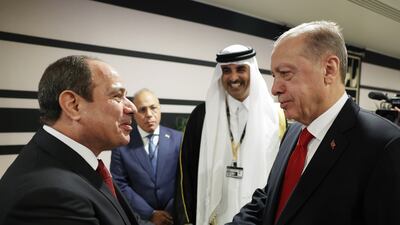After their surprise handshake in Qatar, Turkish President Recep Tayyip Erdogan has said he could meet his Egyptian counterpart Abdel Fattah El Sisi again to lay the foundation for a new phase in relations between their countries.
Mr Erdogan and Mr El Sisi met at the opening of the Fifa World Cup in Qatar last week. It was their first face-to-face encounter since 2013, when the Egyptian military, then led by Mr El Sisi, removed Mohammed Morsi, an Islamist president who had Ankara’s backing, from office.
In a recorded interview with Haberturk TV on Sunday, Mr Erdogan said: “The process with Egypt has started. After minister-level talks, we will get together."
He revealed that he and the Egyptian leader spoke for about 30 to 45 minutes in Doha and that “both sides were happy with the meeting".
There has been no word from the Egyptian presidency on whether a second meeting with Mr Erdogan is on the cards but it described the Doha encounter in a carefully worded statement last week as the “beginning” of developing bilateral relations.
On Monday, Turkish Foreign Minister Mevlut Cavusoglu said Turkey and Egypt may restore full diplomatic ties and reappoint ambassadors mutually "in coming months".
Intelligence delegations from both sides met in Egypt at the weekend, according to Egyptian and Turkish sources cited by Reuters. The two countries are set to begin talks on military, political and commercial issues including energy projects, a Turkish official was quoted as saying, while an Egyptian intelligence official said ways to close the gap in their positions on security issues were discussed at the weekend.
While the recent developments are significant, the road to fully normalised relations could be long and tortuous, with compromise on both sides seemingly unavoidable.
An Turkish-Egyptian rapprochement would fit in with a geopolitical realignment in the region in which Ankara has reached out to smooth tense relations with powerful Gulf Arab nations such as the UAE and Saudi Arabia, as well as Israel. It could reduce the scope of conflict in Syria and even help resolve Libya’s enduring political crisis.
Another plus could be the start of a process to spare Baghdad further Turkish military attacks on Ankara’s Kurdish opponents in Iraqi territory.
Relations have been fraught since 2013, with Cairo routinely denouncing Turkey’s military role in Libya, Egypt’s western neighbour, and in Syria and Iraq. Egypt's pro-government media has for most of the past decade launched personal attacks against Mr Erdogan. However, these stopped about a year ago.
After two rounds of exploratory talks to normalise relations, Egypt remains unhappy with Turkey continuing to provide a safe haven for its critics, particularly members of the now-banned Muslim Brotherhood who face terrorism charges in Egypt or have been tried and convicted in absentia. Egyptian Foreign Minister, Sameh Shoukry, last month said the talks were not making headway.
However, Turkey, in a goodwill gesture last year, shut down TV networks loyal to the Muslim Brotherhood that had nightly criticised and ridiculed the Egyptian leader and his government.
Mr Erdogan and his government have also refrained from public criticism of the Egyptian government, ending repeated declarations over the past decade that they did not recognise Mr El Sisi's administration as legitimate and denouncing Mr Morsi's removal.
But more recently, Turkey infuriated Egypt and its allies Cyprus and Greece — Ankara’s nemeses — when it entered a maritime demarcation agreement with one of the two rival administrations in Libya.
The three countries branded the agreement as illegal and had a similar response when the two sides agreed to explore for oil and gas in Libya’s Mediterranean waters.
Egypt has repeatedly called for the removal of all foreign troops and fighters from Libya, a thinly veiled reference to Turkey's military advisers and allied militiamen. Its calls have fallen on deaf ears.
Another source of continuing tension is Turkey’s tireless efforts to muscle in on plans by Cairo, Athens and Nicosia to turn the eastern Mediterranean into a major energy hub, which have also earned Ankara harsh reprimands from the EU and the US.
“If co-operation is sound and there are good intentions, collaboration [between Turkey and Egypt] will develop in a big way in many fields,” said Abdel Rahman Salah, Egypt’s most recent ambassador to Turkey. “That will not be restricted to natural gas discoveries in the Mediterranean but also in the fields of maritime safety, combating climate change and water desalination.“


